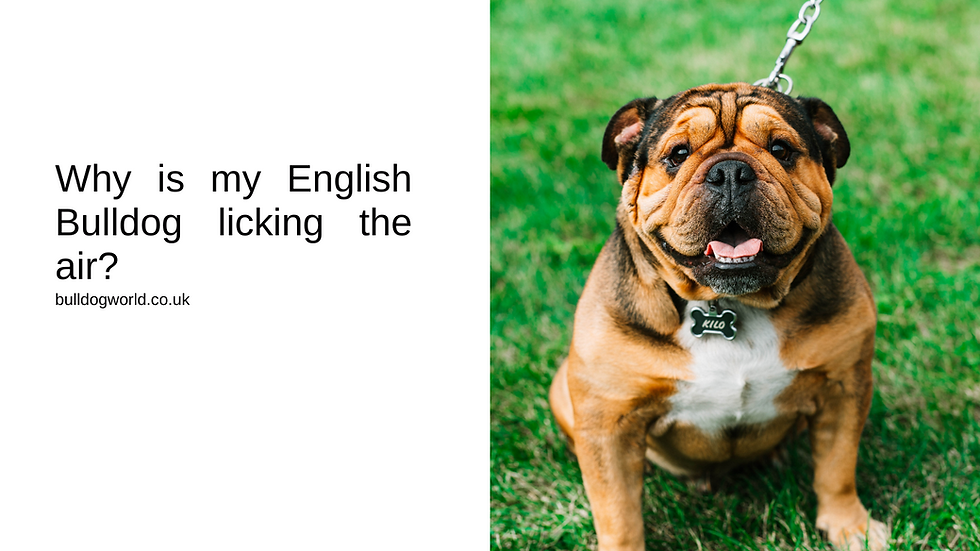Reverse Sneezing in English Bulldogs
- bulldogworlduk
- Apr 3, 2023
- 4 min read
Table of contents:
Reverse sneezing is a condition that commonly affects English Bulldogs. It is a sudden and rapid inhalation of air that is accompanied by a snorting or honking sound. This condition can be alarming for owners who are not familiar with it. In this article, we will take a closer look at reverse sneezing in English Bulldogs and provide insights on how to prevent and manage it.
What is reverse sneezing?
Reverse sneezing is a common respiratory condition that can affect dogs, including English Bulldogs. It is characterized by a sudden and rapid inhalation through the nose that often produces a loud snorting or honking sound. This condition is also known as pharyngeal gag reflex or inspiratory paroxysmal respiration.
Reverse sneezing is not a serious health concern, but it can be a cause for concern for pet owners who are unfamiliar with the condition. During a reverse sneezing episode, a dog may appear to be choking or having difficulty breathing. However, the condition is usually brief and self-resolving, lasting for only a few seconds to a minute.
The exact cause of reverse sneezing is not fully understood. However, it is believed to be related to an irritation or inflammation of the nasal passages, pharynx, or throat. Factors that can trigger reverse sneezing include excitement, exercise, allergies, irritants in the environment, or post-nasal drip.
If you notice your English Bulldog experiencing a reverse sneezing episode, it is important to stay calm and avoid panicking. Gently massaging the dog's throat or softly blowing into their nostrils may help to stop the episode. If the episodes are frequent or prolonged, it is recommended to consult with a veterinarian to rule out any underlying health concerns.
Overall, reverse sneezing is a common and harmless condition in dogs, including English Bulldogs. Understanding what it is and how to manage it can help pet owners provide the best care for their furry friends.
Why do English Bulldogs reverse sneeze?
English Bulldogs are known for their unique and adorable appearance, but they are also prone to certain health issues, including reverse sneezing. This condition can be concerning for owners, but it is usually harmless and can be easily managed.
So, why do English Bulldogs reverse sneeze? Reverse sneezing is believed to occur when a dog's soft palate becomes irritated or inflamed, causing it to spasm and result in a sudden and forceful inhale. In English Bulldogs, this can be caused by a variety of factors, such as allergies, irritants in the environment, excitement, exercise, or even drinking water too quickly.
Certain anatomical factors of the breed may also contribute to reverse sneezing. For example, English Bulldogs have a short and flattened nose, which can make it more difficult for them to breathe through their noses and lead to mouth breathing. This can increase the likelihood of reverse sneezing episodes.
While reverse sneezing is generally not a serious issue, it is important for owners to be aware of their English Bulldog's triggers and take steps to prevent episodes from occurring. This may include minimizing exposure to irritants, avoiding overexcitement, and providing a calm and stress-free environment for the dog. In some cases, medication may also be recommended by a veterinarian to help manage symptoms.
Treatments for reverse sneezing in dogs
Reverse sneezing in dogs can be a concerning and uncomfortable experience for both the dog and their owner. Although it's usually harmless, it can be beneficial to know the different treatments available for reverse sneezing in dogs.
Stop the Episode: One of the most effective ways to stop a reverse sneezing episode is to gently stroke your dog's throat, which can help to calm the muscles and stop the spasms. You can also try covering your dog's nostrils, which can force them to swallow and subsequently stop the episode.
Treat Underlying Causes: In some cases, reverse sneezing can be a symptom of an underlying issue such as allergies, respiratory infections, or nasal mites. Treating the underlying cause can often prevent future episodes of reverse sneezing.
Medication Antihistamines, decongestants, and corticosteroids can help alleviate the symptoms of reverse sneezing in dogs. However, it's important to consult with a veterinarian before administering any medication to your dog, as they can have side effects and may not be appropriate for every dog.
Lifestyle Changes: If your dog experiences reverse sneezing frequently, making changes to their lifestyle can help prevent future episodes. For example, reducing exposure to allergens or irritants, using a humidifier, and avoiding vigorous exercise or excitement can all be beneficial.
It's important to remember that occasional reverse sneezing is usually harmless, and many dogs will only experience it occasionally throughout their lives. However, if your dog experiences frequent or severe episodes, it's always best to consult with a veterinarian to rule out any underlying issues and determine the best course of treatment.
Conclusion
Reverse sneezing is a common condition that affects English Bulldogs. While it can be alarming for owners, it is typically not a serious medical concern. By understanding the causes, symptoms, prevention strategies, and treatment options for reverse sneezing, English Bulldog owners can help their pets live a healthy and happy life. Remember, if you have any concerns about your dog's health or wellbeing, always consult with a veterinarian.



Comments